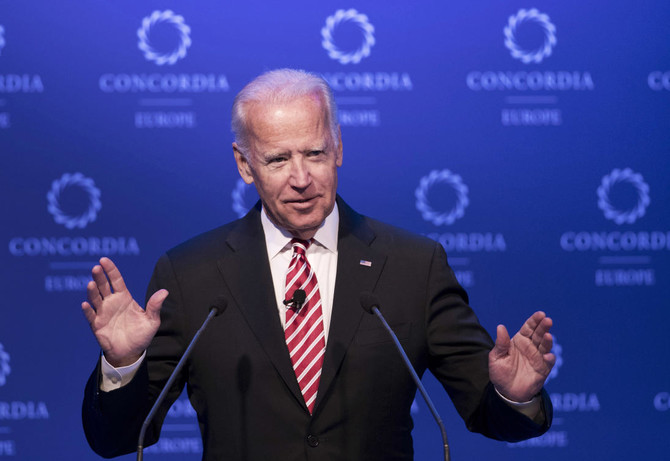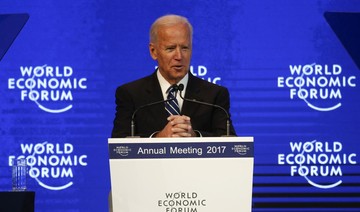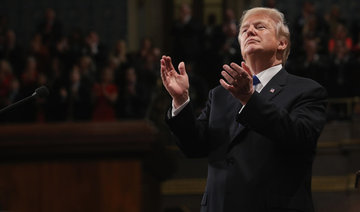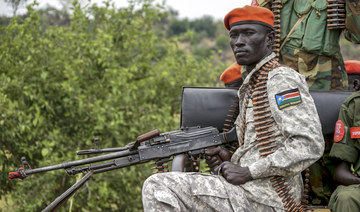WASHINGTON: Former Vice President Joe Biden is tiptoeing toward a potential presidential run in 2020, even broaching the possibility during a recent gathering of longtime foreign policy aides.
Huddled in his newly opened office steps from the US Capitol, Biden began a planning meeting for his new diplomacy center by addressing the elephant in the room. He said he was keeping his 2020 options open, considering it a real possibility. He insisted he had made no decision, and didn’t need to yet, according to five people who either attended the meeting or were briefed on it by those who did.
Biden also expressed interest in bringing those in the room onto his team if he decides to launch a campaign. At the same time, he gave them an out: There would be no hard feelings if they decided they were content in their current roles outside of government, said the people, who demanded anonymity to discuss a private meeting.
The political world has long tried to game out Biden’s plans for 2020. After all, he came close to running last time only to see President Donald Trump pull off a victory that many Democrats openly suggest wouldn’t have happened had he, not Hillary Clinton, been their nominee. Several people came away from the meeting with the impression that if no strong Democratic candidate emerges in the next year or so, Biden would feel strongly compelled to run.
A presidential candidate twice before, Biden would be 78 on Inauguration Day if elected in 2020, a concerning prospect for some Democrats even though he’s only a few years older than Trump. One possibility that Biden’s longtime advisers have discussed privately is that he could announce his intention to serve only one term, clearing the path for his running mate to take over in 2024 and potentially setting up Democrats for a 12-year White House stretch.
Biden’s brief discussion about his 2020 deliberations came as he brought foreign policy staffers together to set the 2018 agenda for the newly opened Penn Biden Center for Diplomacy and Global Engagement — where many of them are now working, including Colin Kahl, his vice presidential national security adviser, and Steve Ricchetti, his former chief of staff. Eli Ratner, his former deputy national security adviser, and Mike Carpenter, the former Pentagon and State Department official who’s now the center’s senior director, also attended, as did Julianne Smith, a Biden adviser in the Obama administration’s first term who now works at the Center for a New American Security, a Washington think tank.
A Biden spokesman declined to comment. But in a recent NBC News interview, Biden said he’d decide on running in 2020 based on whether it was “the right thing to do.”
“I’m focused on one thing: electing a Democratic Congress to stop this erosion of the core of who we are,” Biden said. “I’ll look at that a year from now. I have plenty of time to consider whether or not to run.”
The meeting was one of several signs that Biden is beginning to position himself as an alternative to Trump. Biden has started denouncing the current president’s leadership more frequently in public, as he crisscrosses the United States and beyond to promote his new book, his cancer initiative, his new domestic policy institute in Delaware, the diplomacy center and his new political action committee, American Possibilities.
He’s also been gearing up to play a major role campaigning for Democrats seeking to retake the House and Senate in the 2018 midterms.
“Donald Trump’s looking out for Donald Trump. Republicans are looking out for Donald Trump. Who’s looking out for everyone else? Democrats,” Biden wrote in a recent fundraising pitch to the PAC’s supporters. He said in 2018, he would “beat a path all across this country to stand up for leaders who will stand up for all of us.”
In 2015, Biden’s face was plastered across cable news channels and newspaper front pages for months as he carried out a lengthy deliberation about whether to challenge Clinton for the nomination. Ultimately, he decided he and his family weren’t in position to run so soon after his son, former Delaware Attorney General Beau Biden, died from brain cancer earlier that year. Yet many Democrats have argued that his “everyman” brand and blue-collar appeal would make him particularly well-suited to challenge Trump.
Biden, in public and private, tiptoes toward a 2020 run
Biden, in public and private, tiptoes toward a 2020 run

Frustrated Ghanaians brace for more power cuts

- Nigeria provides Ghana with a percentage of the gas it needs to fire its power-generating plants
ACCRA: Exasperated Ghanaians already grappling with frequent, unplanned power outages are steeling themselves for more misery after electricity distributors announced increased disruption to the grid in the coming weeks.
The blackouts, known as “dumsor” in Ghana’s Akan language, are making it harder to run businesses that are already struggling due to the country’s economic crisis — the worst in a decade.
On Thursday, the Ghana Grid Company and the Electricity Company of Ghana, which distribute power throughout the West African country of 33 million people, said there would be three weeks of load management because of maintenance work by a gas supplier in Nigeria.
FASTFACT
The erratic power supply is tipped to become a key topic in the December presidential election campaign.
Nigeria provides Ghana with a percentage of the gas it needs to fire its power-generating plants.
The announcement came a day after WAPCo, the operator of the pipeline importing gas from Nigeria, also warned there would be a drop in the quantity of gas available because of maintenance work in Nigeria.
The news has exasperated Ghanaians, who are already dealing with frequent power cuts.
“The current unannounced power cuts are already making it very hard to keep my poultry frozen,” said Judith Esi Baidoo, a 50-year-old frozen poultry vendor in Accra.
She added: “Now, with this three-week load management plan, I fear my stock will spoil. I don’t know how my business can survive this.”
The erratic power supply is tipped to become a key topic in the December presidential election campaign.
Timothy Oddoye, who repairs mobile phones in the Accra suburb of Kokomlemle, said: “The government had failed us. They’ve had years to fix these problems, yet we still suffer from the same issues.
“How can we grow our businesses when we can’t even rely on basic electricity?”
Despite being one of the African countries where electrification is most advanced, Ghana continues to experience chronic power shortages.
Domestic electricity production — generated by power plants that are often old and poorly maintained — has struggled to expand in line with rising demand.
According to International Energy Agency figures, Ghana generates 34 percent of its electricity from hydropower and 63 percent from gas.
The country produces oil and gas but still needs to import gas from Nigeria via the 678-km West African Gas Pipeline through Benin and Togo.
“The reliance on gas, especially from external suppliers, leaves us vulnerable,” said Ben Boakye, the Africa Center for Energy Policy executive director.
“The government must prioritize investments in renewable energy and upgrade our existing hydro and thermal plants to ensure consistent power supply.”
Public frustration at the power cuts erupted on June 8, when hundreds of Ghanaians, led by prominent celebrities, took to the streets of Accra to protest against the erratic supply under the slogan #DumsorMustStop.
These power cuts are all the more disturbing for Ghanaians as the country emerges from an economic crisis that saw inflation soar to 54 percent in December 2022.
It fell back to 25 percent in April 2023 but the population still suffers.
Ex-leader Jacob Zuma’s party says it will join opposition in South Africa’s parliament

- ANC and largest rival, the white-led, pro-business Democratic Alliance, agreed on Friday to work together in a coalition
JOHANNESBURG: South Africa’s uMkhonto we Sizwe (MK) party will join an alliance of smaller opposition parties in parliament in a bid to take on the African National Congress and Democratic Alliance-led coalition government, it said on Sunday.
The ANC and its largest rival, the white-led, pro-business Democratic Alliance, agreed on Friday to work together in a coalition it called “government of national unity,” a step change after 30 years of ANC rule.
Two smaller parties, the socially conservative Inkatha Freedom Party (IFP) and the right-wing Patriotic Alliance, will also take part in the unity government.
Former president Jacob Zuma’s uMkhonto we Sizwe party came in a surprisingly strong third in the May 29 election which saw the ANC lose its majority. MK won 14.6 percent of the vote which translated into 58 seats in the 400-seat National Assembly.
However, MK lawmakers boycotted the first sitting of the National Assembly on Friday after filing a complaint at the country’s top court alleging vote-rigging, which the court dismissed as without merit.
Spokesperson Nhlamulo Ndhlela told reporters that the MK party will join the alliance called the “Progressive Caucus,” which includes the Marxist Economic Freedom Fighters (EFF) and the center-left United Democratic Movement.
This alliance commands close to 30 percent of the seats in the National Assembly, Ndhlela said, sitting next to Zuma and the leaders of a number of small parties.
“This united effort is necessary because the 2024 election has also resulted in the consolidation of right-wing and reactionary forces who are opposed to economic freedom, radical economic transformation, racial equality and land repossession,” he said.
Ndhlela said that MK had decided to take up its seats in the National Assembly after receiving legal advice and that it would continue to raise its allegations of a rigged elections in parliament and in courts.
Ukraine summit paves way for peace talks with Russia

- Leaders and officials from more than 90 states spent the weekend for summit dedicated to resolving largest European conflict since World War II
- Ukrainian President Volodymyr Zelensky voices hope of garnering international agreement around proposal to end the war that he could present to Moscow
BURGENSTOCK: Dozens of countries meeting for a landmark international summit on peace in Ukraine agreed Sunday that Kyiv should enter dialogue with Russia on ending the war, while strongly supporting Ukraine’s independence and territorial integrity.
More than two years after Russia invaded, leaders and top officials from more than 90 states spent the weekend at a Swiss mountainside resort for a two-day summit dedicated to resolving the largest European conflict since World War II.
“We believe that reaching peace requires the involvement of and dialogue between all parties,” stated a final communique, supported by the vast majority of the countries that attended the summit at the Burgenstock complex overlooking Lake Lucerne.
The document also reaffirmed a commitment to the “territorial integrity of all states, including Ukraine.”
The declaration also urged a full exchange of prisoners of war and the return of deported children.
But not all attendees backed the document, with India, Saudi Arabia and the United Arab Emirates among those not included in a list of supporting states displayed on screens at the summit.
After world leaders stood together to offer their support on Saturday, Ukrainian President Volodymyr Zelensky voiced hope of garnering international agreement around a proposal to end the war that he could eventually present to Moscow.
The summit focused Sunday on food security, avoiding a nuclear disaster and returning deported children from Russia as countries outlined building blocks toward ending the war.
The summit, snubbed by Russia and its ally China, came at a point when Ukraine is struggling on the battlefield, where it is outmanned and outgunned.
On Friday, Russian President Vladimir Putin demanded Kyiv’s effective surrender as a basis for peace talks.
Putin’s call for Ukraine to withdraw from the south and east of the country were widely dismissed at the summit.
But the Kremlin insisted Sunday that Ukraine should “reflect” on Putin’s demands, citing the military situation on the ground.
“The current dynamic of the situation at the front shows us clearly that it’s continuing to worsen for the Ukrainians,” Kremlin spokesman Dmitry Peskov said.
“It’s probable that a politician who puts the interests of his country above his own and those of his masters would reflect on such a proposal.”
Russia on Sunday claimed its troops had captured Zagrine village in southern Ukraine, continuing its progress on the front line.
The Burgenstock talks were framed around areas of common ground between Zelensky’s 10-point peace plan presented in late 2022, and UN resolutions on the war that passed with widespread support.
The tight remit was an attempt to garner the broadest support by sticking firmly to topics covered by international law and the United Nations charter.
Countries split into three working groups on Sunday looking at nuclear safety and security, humanitarian issues, and food security and freedom of navigation on the Black Sea.
The session on humanitarian aspects focused on issues around prisoners of war, civil detainees, internees and the fate of missing persons.
It also discussed the repatriation of children taken from occupied Ukrainian territory into Russia.
Talks on food security examined the slump in agricultural production and exports, which has had a ripple effect across the world as Ukraine was one of the world’s breadbaskets before the war.
Talks looked at not only the destruction of fertile land through military operations but also the ongoing risks posed by mines and unexploded ordnance.
Artillery attacks on ships in the Black Sea have driven up the cost of maritime transport.
The nuclear safety group looked at the fragile situation surrounding the safety and security of Ukraine’s nuclear power plants, notably Zaporizhzhia, where all of the reactors have been shut down since mid-April.
Talks honed in on reducing the risk of an accident resulting from a malfunction or an attack on Ukraine’s nuclear facilities.
“When a just and sustainable peace comes, we will all be there to help Ukraine rebuild,” Canadian Prime Minister Justin Trudeau said in the final address from invited leaders.
“The people who lost their lives, the families destroyed, they won’t be able to bring them back. That’s the most painful consequence of war: the human suffering.
“This illegal war by Russia needs to end,” he said, while accepting that “it won’t be easy.”
Minds also turned to a potential second summit, at which Ukraine wants to present Russia with an internationally-agreed plan for peace.
Swiss President Viola Amherd said in her closing remarks: “One key question remains: how and when can Russia be included in the process?
“We have heard it in many of your statements: a lasting solution must involve both parties,” she said, while acknowledging that “the road ahead is long and challenging.”
Zelensky did not say whether he was prepared to engage with Putin directly in talks to end the conflict, though he has in the past ruled out direct talks with him.
“Russia should join this process because Russia is responsible for the starting of the process that’s called the war,” Georgian President Salome Zourabichvili told reporters.
UK ‘morally incoherent’ in supplying arms to Israel, aid to Gaza: Oxfam chief

- Halima Begum criticizes stance of Britain, Western leaders
LONDON: Providing arms to Israel while offering humanitarian aid to Gaza at the same time is “intellectually and morally incoherent,” the head of Oxfam GB has told The Guardian.
The remarks followed Oxfam’s approval to formally intervene in a legal challenge opposing UK arms sales to Israel.
The judicial review is being brought by the Palestinian human rights group Al-Haq and the UK-based Global Legal Action Network.
Israel’s assault on Gaza has killed more than 37,000 Palestinians, the majority being women and children, according to the Gazan Health Ministry.
Recent government data shows that the UK issued 108 arms export licenses to Israel between the Oct. 7 attacks and May 31, without rejecting or revoking any during this period.
Halima Begum, Oxfam GB’s chief executive, who recently returned from Israel and the occupied West Bank, criticized the UK’s stance.
She told The Guardian: “Whether you say they are components or whole weapons (being sold) is a moot point, because individual components collectively constitute these devices that are killing so many innocent people.
“The UK needs to stop selling these arms. The government can’t simultaneously give humanitarian aid and talk about its aspirations for peace in the region, then also ship bombs — it’s intellectually and morally incoherent.
“That the law doesn’t prevent the trade seems immaterial. If you knowingly sell weapons that are being used to kill thousands of innocent children and their parents, why would you continue?”
While Begum was unable to enter Gaza due to Israel’s attack on Rafah, she said she was left “shell-shocked” after hearing firsthand accounts of the humanitarian crisis from Palestinian colleagues evacuated from the enclave.
She highlighted historical precedents for the UK and US refusing to arm Israel, noting decisions in 1982 and 2002.
Begum said: “Margaret Thatcher halted weapons exports to Israel during the Lebanon War. Ronald Reagan suspended shipments of cluster munitions in July 1982 and he was reportedly so shocked by images of dismembered Palestinian children in a bombardment on Aug. 12 that he warned Israeli PM Menachem Begin ‘our entire future relations are at stake if this continues.’
“Israel ordered a complete ceasefire before the day was out. So, it wouldn’t be the first time a British or US government has drawn a moral line.”
She added: “Gazan children are being bombed, suffering from malnutrition and facing potential famine and the UK still can’t constrain the Israeli military. It defies belief we’d support this action; our humanity seems to be seeping away.”
Begum also noted that the Global South was largely unified on the need for action regarding Gaza and that it appeared to be “only Western leaders that don’t see what is morally the right thing to do.”
She added: “If you have a friend and their behavior is atrocious, you’re still able to say, ‘Look, as friends, you shouldn’t be doing that.’ That doesn’t mean you can’t offer your support to a friend.
“I feel as though that whole construction around Israel’s right to self-defense, every country has a right to defend themselves, but not at the cost of humanitarian law being ripped up in shreds, without any reference to human rights on the ground.”
The UK government declined to comment.
Swedish diplomat in ‘seventh heaven’ following release from Iran

- “I have been waiting for this for almost 800 days,” Floderus said
STOCKHOLM: Swedish citizen Johan Floderus said he was in seventh heaven following his release from an Iranian prison on Saturday, in a recording published on the Swedish government’s website on Sunday.
Sweden and Iran carried out a prisoner exchange on Saturday with Sweden freeing a former Iranian official convicted for his role in the mass execution and torture of political prisoners in Iran in 1988, while Iran released two Swedes being held there.
“I’m in the sky but emotionally I’m in seventh heaven. I have been waiting for this for almost 800 days,” Floderus said in a recording of a telephone call between him and Swedish Prime Minister Ulf Kristersson while he was on the flight back to Sweden.
Floderus, a European Union employee, was arrested in Iran in 2022 and charged with spying for Israel and “corruption on earth,” a crime that carries the death penalty.
He said he had dreamt of the day of his release endless times. “Only to later wake up on that damn concrete floor,” he said. “Now it is starting to sink in that I have left Iranian airspace and I am on my way back home again.”
In a radio interview earlier on Sunday, Kristersson dismissed criticism from the wife of Swedish-Iranian dual national, Ahmadreza Djalali, who remains in an Iranian jail after Tehran refused to include him in the exchange.
“I have a lot of respect for her disappointment, but don’t really understand the criticism. The alternative would have been to leave the two Swedes who could now come home,” he told Swedish radio.




















